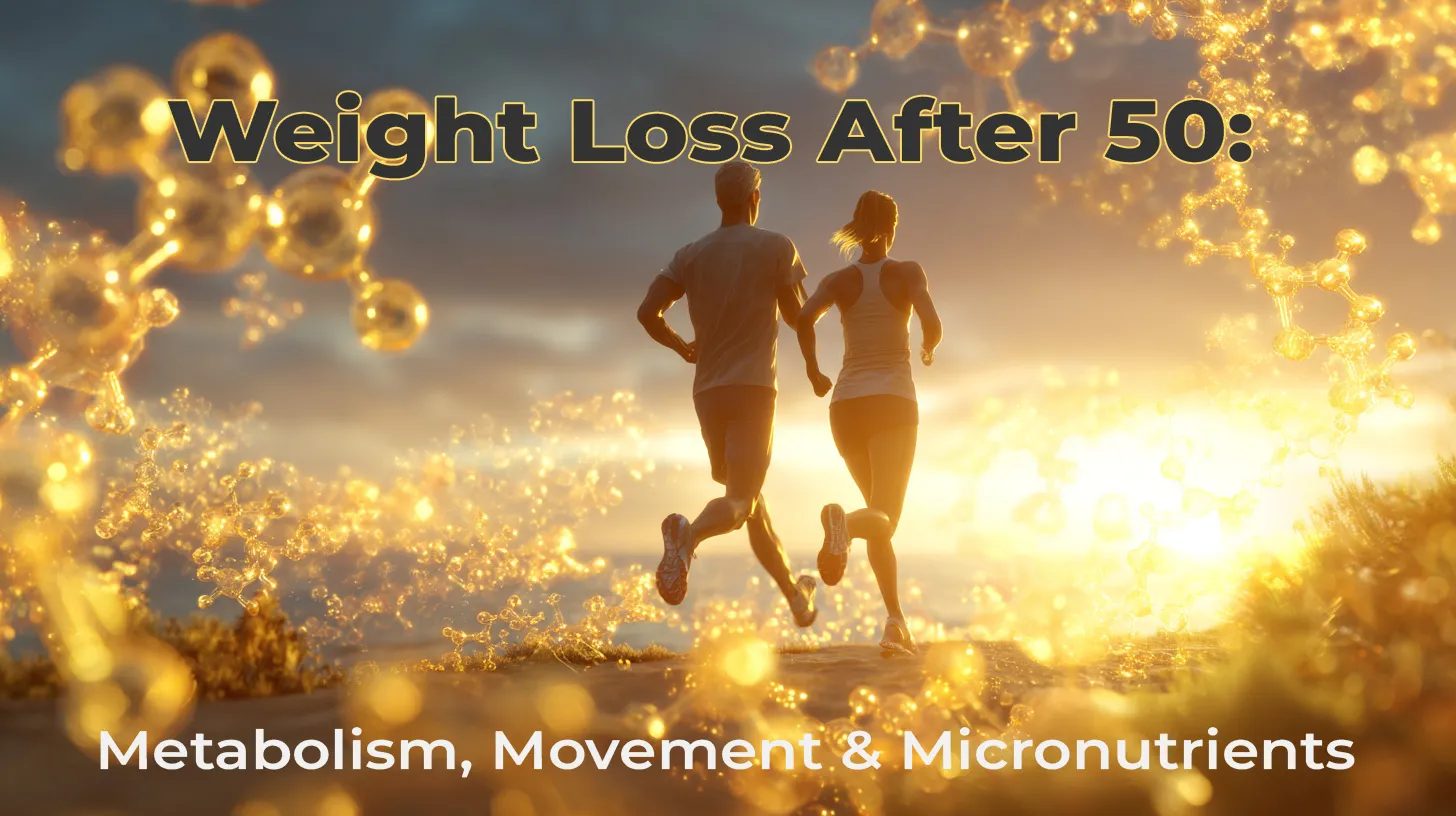Editor’s Note: This article discusses insights from a recent feature published by Men’s Health on effective weight loss strategies after 50. Their team consulted with leading dietitians and health experts to understand why metabolism slows with age — and what practical steps can still make a difference. Below, we summarize their key points and share the Life Tree HQ perspective on how nutrient optimization and smart habits can accelerate results.
Article Summary
Weight loss becomes more challenging for people over 50 because their metabolism slows down, they lose muscle mass, experience hormonal changes, and encounter various lifestyle barriers; yet, they can still achieve weight loss. Experts recommend consuming foods rich in nutrients, such as fruits, vegetables, beans, nuts, and whole grains, while avoiding sugary drinks and processed foods. Your weight loss success depends on doing resistance exercises and cardio workouts, practicing mindful eating, staying hydrated, and getting enough sleep. The article supports achieving weight loss through balanced eating instead of dieting and recommends ongoing self-tracking and expert support for maintaining weight loss over time.
Weight management for adults between 50 and 60 years old requires more than just physical appearance, as it helps them preserve metabolic flexibility and protect their muscle mass while reducing inflammation associated with chronic diseases. The traditional approach of reducing food intake and increasing physical activity fails to produce results when people experience hormonal changes and decreased energy levels. Your ability to select effective weight loss methods improves when you understand how your body transforms during aging.
While the original article focuses on lifestyle and fitness habits, we wanted to expand the discussion with a science-based examination of metabolism, vitamins, and healthy aging — here’s our take.
🌿 LTHQ Take
Life Tree HQ views weight management for individuals aged 50 and above as a metabolic recalibration aimed at enhancing nutrient levels and cellular energy, rather than focusing solely on calorie reduction. The human body undergoes three primary changes during aging, primarily due to the reduced efficiency of mitochondrial function, decreased muscle strength, and reduced insulin sensitivity. The body requires essential nutrients to operate at peak performance.
The combination of B12 and D3 vitamins, along with magnesium, chromium, and green tea polyphenols, facilitates improved energy metabolism and better control of blood sugar and fat oxidation. The combination of these micronutrients with regular exercise, proper protein intake, and sufficient sleep will help you achieve lasting weight management.
The primary objective of nutrition planning for individuals aged 50 and above should focus on strategic food selection rather than attempting extreme weight loss. Your body needs specific foods that support mitochondrial function and blood sugar stability. The energy production and muscle function of your body receive support from magnesium-rich leafy greens, including spinach, Swiss chard, and kale. The combination of almonds and pumpkin seeds in your diet provides continuous energy while delivering vital minerals that support metabolic processes.
The body can improve insulin sensitivity by increasing vitamin D3 levels through exposure to morning sunlight for 10–15 minutes. The combination of omega-3 fatty acids from salmon and sardines, consumed twice a week, helps fight inflammation while protecting lean body mass. Greek yogurt with flaxseed and fiber-dense berries makes an excellent snack option because it helps you feel full while supporting gut health, which in turn has a direct impact on your weight management. Drinking water before meals can aid digestion and lead to lower calorie consumption.
Recovery and sleep stand as essential factors that should not be ignored. The body produces more hunger hormones (ghrelin) and fewer satiety hormones (leptin) when sleep quality is poor, which makes it harder to stop eating between meals. The amount of weight control achieved through sleep matches the effects of diet and exercise when people get seven to eight hours of high-quality rest.
Lifestyle Integration: Small Habits, Lasting Change
True transformation after 50 doesn’t happen from the gym alone — it’s the combination of movement, mindset, recovery, and consistency. Aim for 7–8 hours of quality sleep each night to keep hunger hormones like ghrelin in check and support muscle repair. Manage stress with brief daily walks, yoga, or breathing routines that lower cortisol, which otherwise encourages belly fat storage. Even simple habits, like preparing meals at home or doing light resistance bands before breakfast, compound over time. The key is to create small rituals that you can maintain every day — because metabolic health thrives on consistency, not extremes.
If you’re over 50 and ready to approach weight loss scientifically — from hormone balance to mitochondrial health — read our in-depth guide:
👉 Vitamins That Help With Weight Loss
Source:
Adapted from “21 Easy Ways to Lose Weight After 50” originally published by Men’s Health. Life Tree HQ provides independent commentary and science-based context.

